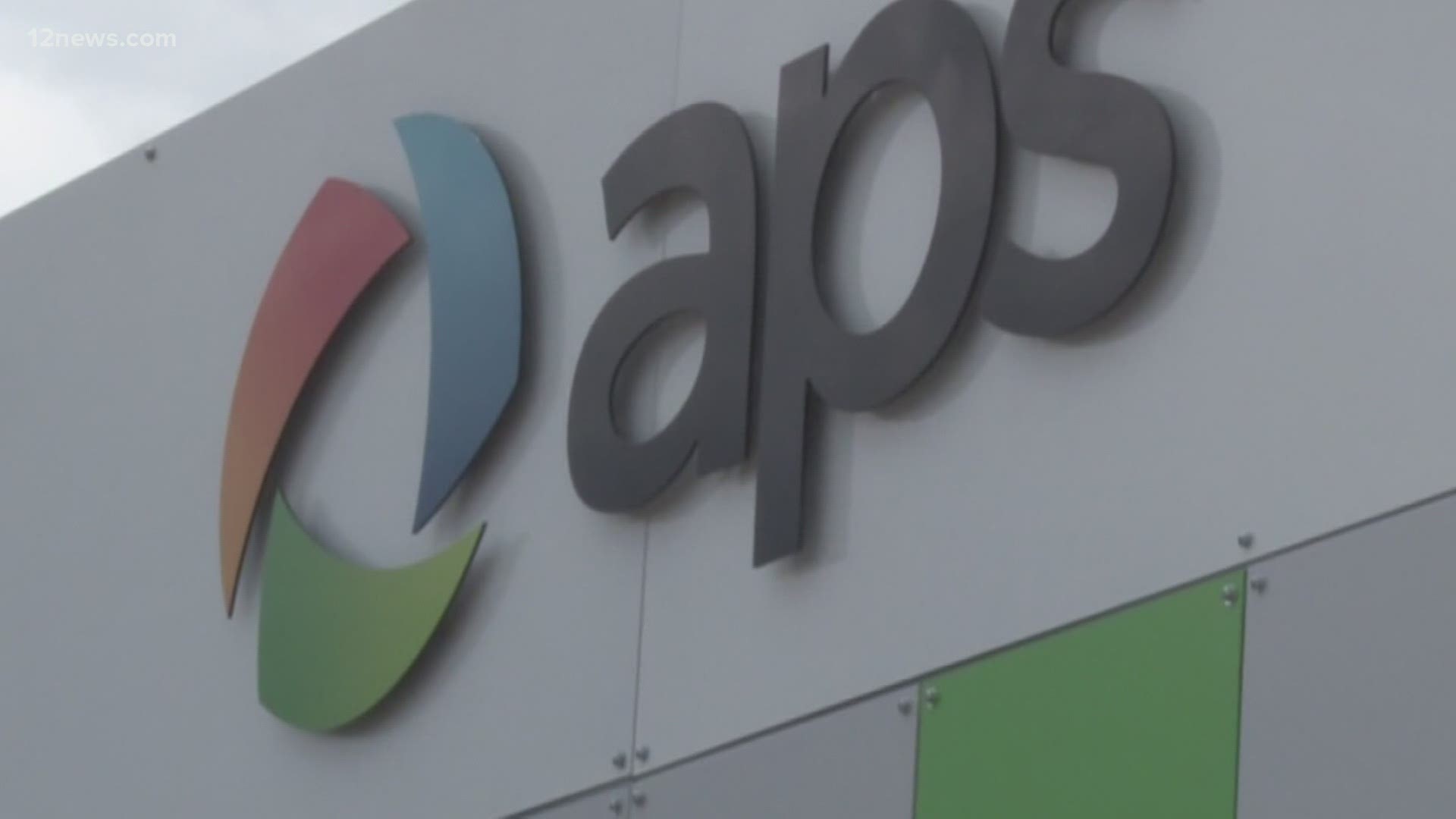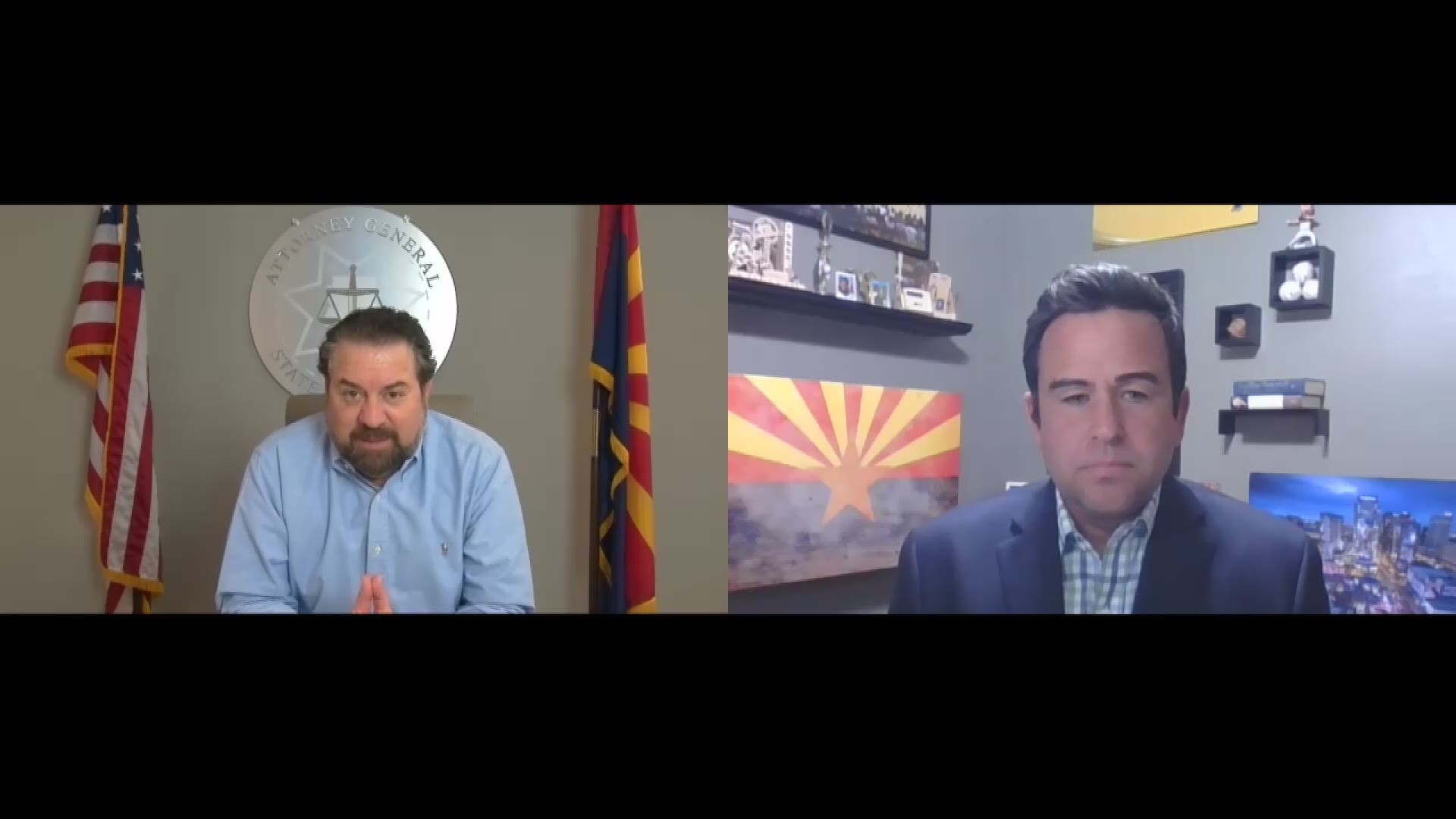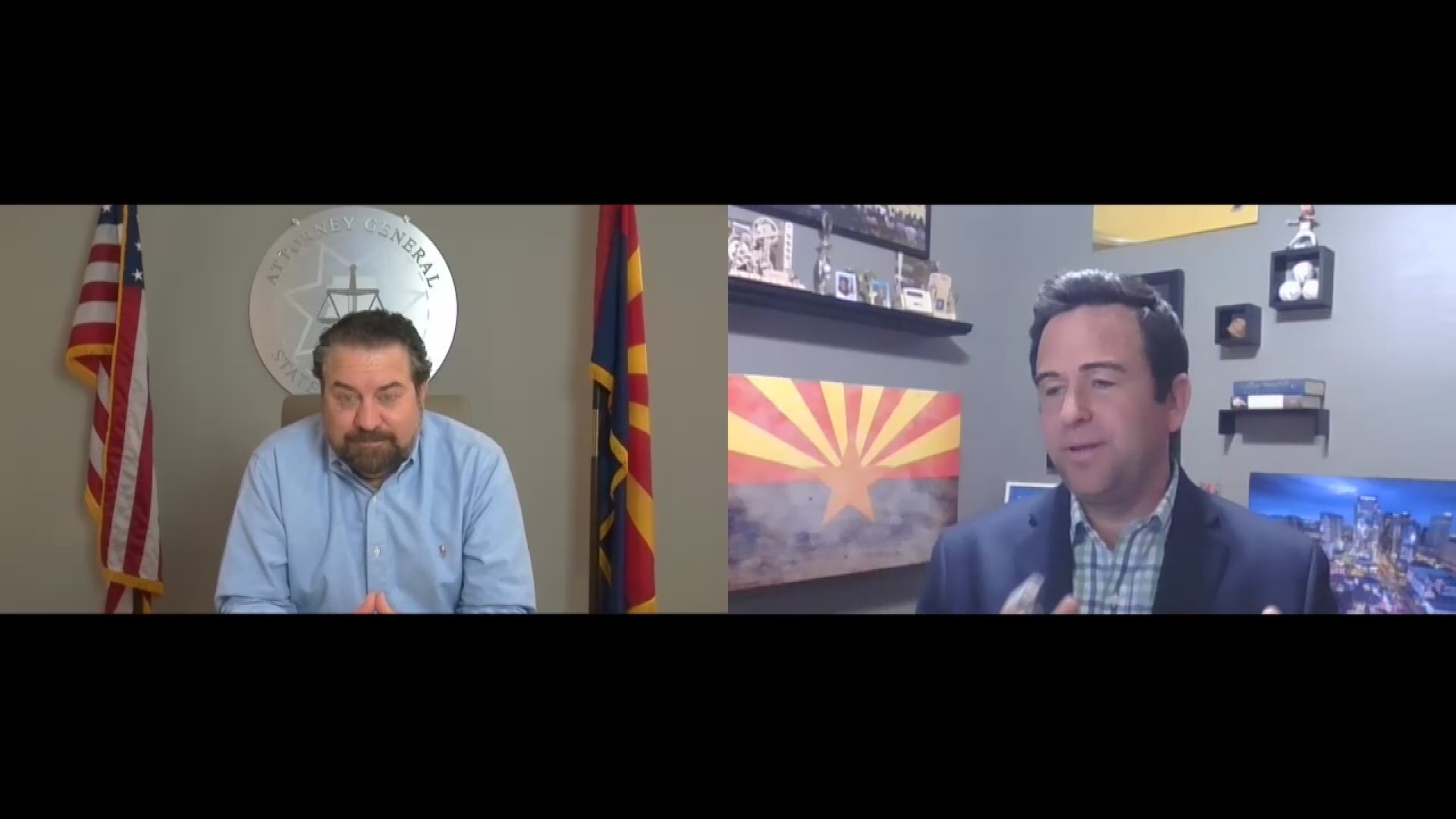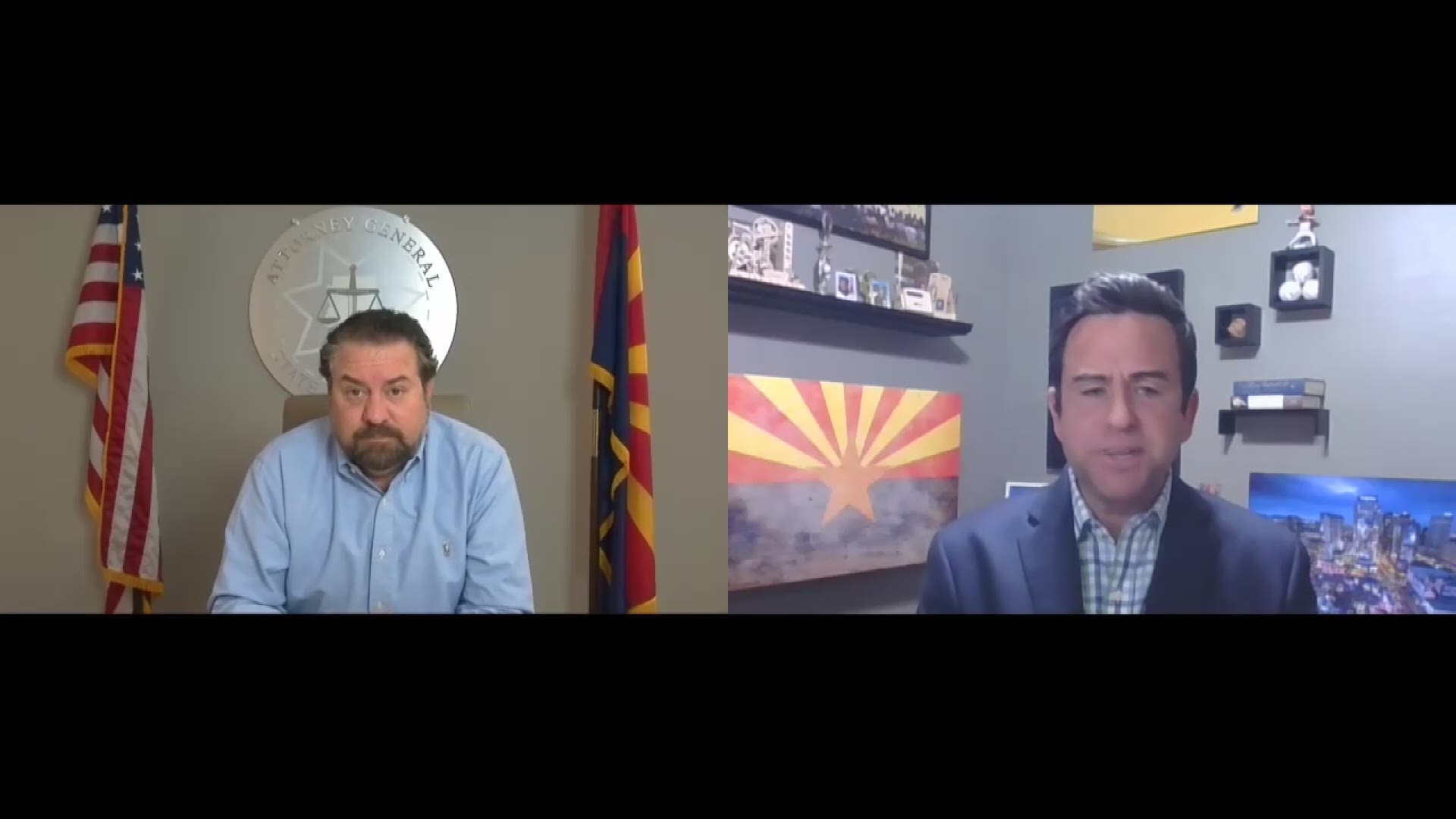PHOENIX — The surprise announcement by the Arizona Attorney General's Office of a $25 million settlement this week with utility company APS has longtime consumer advocates both relieved and skeptical.
And for good reason.
They have been burned before by the very institutions that are supposed to hold APS accountable. And there is no way to know if this time is different.
'Taken to the wood shed'
Attorney General Mark Brnovich, who has a track record of amassing big payouts from companies accused of bad behavior, said he negotiated a payout for more than 200,000 Arizona consumers, who may have been unfairly overcharged by APS due to a faulty online rate advisor tool and inadequate customer communication dating back to 2017.
According to the complaint, the attorney general’s office accused APS of violating a consumer protection law involving false promises, unfair practices and suppression of facts. Brnovich’s office negotiated the settlement with APS behind closed doors.
“What we did in this case was something unique and historic,” Brnovich said. “It was unusual to have the AG, and to have a quasi-monopoly in this context that’s regulated by the [Arizona] Corporation Commission, was basically taken to the woodshed.”
We don’t know what investigators uncovered about APS
An ironclad state law passed in 2013 protects the attorney general’s office from being forced to release any record of any investigation, ever.
Unless Brnovich personally agrees to release the APS investigative records, which he has the discretion to do if he determines “the ends of justice and the public interest will be served," APS customers will not know if there is more evidence of wrongdoing being withheld from them.
They also do not know to what level APS leaders may have intentionally misled consumers.
Since publication of this story, a spokesperson has provided additional details of the investigation.
“Our dedicated public attorneys and investigators conducted an extensive, thorough and comprehensive investigation that included analyzing information, reviewing significant amounts of data and documents, and speaking with APS representatives,” said Katie Conner, spokesperson for The Attorney General’s Office
AG: APS is not accused of acting “with intent”
The complaint filed by the attorney general’s office alleges APS made “errors” and “did not inform adequately regarding the benefits of switching to their most economical plan.”
The law states a person may have acted with intent to be in violation, but does not have to act with intent. There is no language in the complaint or settlement agreement describing who at APS may have been found to have acted with intent.
APS denied it violated any laws.
Question of jurisdiction
Brnovich said the settlement avoids years of potential litigation because attorneys for APS contended there was an issue of whether the attorney general’s office had jurisdiction to investigate the utility at all.
“They [attorneys for APS] would push back on the issue of jurisdiction and whether this is pre-empted by what the [Arizona] Corporation Commission’s duties and responsibilities are,” Brnovich said.
Former Attorney General Terry Goddard (D) agrees the settlement is unique.
“It appears to me it is unusual for a state official on their own to take action when there is a state agency [Corporation Commission] that has jurisdiction. Implicitly, he’s criticizing the Corporation Commission, I guess, by saying he can take better action than they do,” Goddard said.
Will there be more investigations?
Brnovich also declined to say whether any other investigations will stem from the APS probe.
One key player who has faced scrutiny in the past is former APS CEO Don Brandt. Brandt was under investigation by the FBI for his role in dark money campaign contributions dating back to 2014, the details of which were never released.
Brandt had the ultimate say about how APS delivered services to customers until he retired in 2019. Brandt declined interviews with media outlets for years to discuss his decisions at the company.
Diane Brown, executive director of the Public Interest Research Group (PIRG), applauded the settlement for ensuring customers receive compensation and said the settlement ratchets up scrutiny against APS to “an all-time high.”
Brown also acknowledged that because details of the investigation will not be released, the public does not know if there are other issues regulators and watchdog groups should pursue, and whether Brnovich decided not to pursue certain aspects of APS practices.
“It definitely raises questions whether the attorney general found additional problems,” Brown said.
$25 million versus $300 million
One recent analysis submitted to the ACC, using APS’s own earnings numbers, states the company has generated more than $100 million annually of non-approved surplus revenue since the rate increase launched in August 2017.
“APS has been placing, steering and keeping hundreds of thousands of customers on more expensive plans,” said computer analyst Abhay Padgaonkar, who provided expert testimony in the original citizens complaint.
Padgaonkar also helped expose the online rate tool debacle that helped prompt the attorney general’s investigation.
“The $25 million settlement pales in comparison to the $300- $350 million in surplus revenue APS has generated since the rate increase,” Padgaonkar said.
When asked if AG investigators attempted to determine how much APS over-earned since 2017, Brnovich said those questions should be posed to the Arizona Corporation Commission.
“What APS did or did not earn is a question for the Arizona Corporation Commission. They are the ones responsible when APS makes a rate case,” said Brnovich.
History of letdowns for APS customers
Since 2014, APS provided generous grants and political donations that directly or indirectly benefitted consumer nonprofits, ACC commissioners and the current Arizona attorney general.
All three have made pivotal decisions concerning APS’s business practices. The first two, in retrospect, severely let down utility ratepayers in 2017 when the commission and many consumer groups supported the now highly criticized rate design.
Making matters worse, APS did not follow industry standards under the rate design and failed to properly educate customers about their electricity billing options while reaping lucrative rewards in the process, according to independent audits.
Federal energy cost estimates showed in 2019 APS electricity was costing consumers an average of 30% more than other electric utilities in Arizona.
Why didn’t Brnovich recuse himself?
Over the past two election cycles, Mark Brnovich the candidate has benefitted from more than a half million dollars in campaign donations from APS.
In 2015, Brnovich announced he walled himself off from an investigation connected to the activities of APS to avoid the appearance of a conflict of interest.
Brnovich explained then in a media statement he personally recused himself because “I value the public trust and I would not want my participation to become a distraction.”
When asked about the potential for a conflict of interest in this latest APS investigation and whether he considered recusing himself, Brnovich said there was no conflict of interest and stated the question was a “Democratic talking point."
“I think it’s insulting to me and to everyone in this office to imply that there is somehow a potential conflict,” Brnovich said. “You’re talking about (political) contributions that were made to a third-party organization.”
“My job is to protect Arizonans. We don’t play politics in this office,” he said.
Asked what the difference is between the 2015 case and the latest case, a spokesperson for Brnovich did not specify.
“It’s disappointing and very disingenuous that you continue to push this manufactured narrative – there is no conflict of interest. General Brnovich has an exemplary record in protecting Arizona consumers,” said Katie Conner, a spokesperson for the attorney general’s office.
'He’s negotiating with someone that’s been a big campaign contributor'
Last year, consumer advocates Stacey Champion and Abhay Padgaonkar questioned whether Brnovich should personally recuse himself when he announced he was launching the investigation.
However, they also said they welcomed his office investigating APS.
Paul Bender, constitutional law professor at Arizona State University, said it is understandable why people have questioned why Brnovich did not recuse himself, simply to avoid a perception of a conflict.
“Unfortunately, it’s part of our electoral system depending so much on money,” Bender said. “He’s put in a difficult position if he’s negotiating with somebody that’s been a big campaign contributor.”
Secrets kept about APS
Even when outside experts were commissioned to analyze APS practices, the Arizona Corporation Commission attempted to leave consumers in the dark.
APS customer and business owner Stacey Champion launched the first formal complaint against APS’s new rate design in 2018.
After a 2-week hearing about the company’s actions, an administrative law judge concluded “there was the possibility APS could be exceeding its authorized rate of return” and recommended a fuller, more complex, rate review be conducted.
That review spurred an independent audit, paid for by ratepayers in 2019.
Yet after the audit was finished, a staff member at the commission omitted crucial embarrassing details about APS from the audit in the final published report.
Arizona Corporation Commission Utility Director Elijah Abinah, who is unelected, has a history of making decisions that benefit APS and its public image and has refused requests for interviews with 12 News.
When pressed to release the unedited version of the independent report, Abinah’s attorneys refused even though state law suggested the unedited draft was a public record.
Not until 12 News partnered with The ASU First Amendment Clinic and threatened to sue the ACC, did the commission staff finally release secret details of the draft report.
It revealed damning findings:
- APS earned more actual Return on Equity (ROE) than authorized by the commission
- With adjustor revenues factored in, APS earned $77 million more than expected in 2018
- APS internal surveys showed eroding customer satisfaction, contrary to sworn testimony provided by then-CEO Don Brandt
- Certain fees were rolled into base rates in 2017, only to return to pre-rate increase levels on separate line items in customer bills the following year. That was a violation of the original agreement with the ACC.
- APS showed “a lack of full disclosure” in customer outreach
- The advertised impact of APS bills of an average $6 increase was simply “not accurate”
Those details reinforced the belief among Champion and others that the game was rigged against consumers.
“It’s sad to think about, but if it wasn’t for 12 News and ASU demanding transparency, we would have never known this information,” Champion told 12 News at the time.
Abinah remains in his influential position at the Arizona Corporation Commission while APS negotiates a new rate design.
RUCO’s failures
One agency, the Residential Utility Consumer Office (RUCO), funded by APS customers, was supposed to act as a watchdog against abuse.
Consumer advocates in 2019 slammed the agency’s director, Jordy Fuentes, for his response to concerns of over-earnings.
Critics claimed RUCO submitted a “flawed analysis” of only five customer bills to the commission that exonerated APS of wrongdoing.
Fuentes told 12 News at the time they were still analyzing APS’s actions.
Fuentes later testified in an Arizona Corporation Commission hearing APS needed a culture change.
“I think it’s become clear that APS has failed in its obligations to its customers,” Fuentes said in October of 2019.
“Where have you been this whole time? You are Johnny come lately,” said Commissioner Sandra Kennedy in response.
For many APS critics, RUCO’s inaction represented yet another organization failing to hold APS accountable in a timely manner.
What’s next for APS?
APS CEO Jeff Guldner, who replaced Brandt in 2019, said the settlement is an acknowledgment “there are areas where we could have done better” when it undertook the herculean task of moving customers to new plans after the rate design was approved in 2017.
“This agreement acknowledges that and recognizes our commitment to inform customers of their service plan options and to provide effective tools and resources for choosing the one that’s right for them,” Guldner said.
“We now provide all residential customers with information every month about whether they could save money on a different plan and the flexibility to switch plans as often as they choose.”
It remains to be seen what kind of rate design the Arizona Corporation Commission will approve for APS later this year.
Brown of PIRG hopes Brnovich’s actions have sent a strong message that the commission needs to be more vigilant.
“This is particularly important because APS is asking for another 169 million dollars in this latest rate case,” Brown said.
This article includes a correction about the nature of the consumer protection law. A person does not need to have been found to act “with intent” to be in violation.




